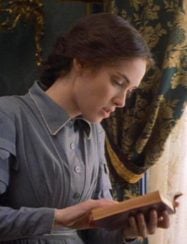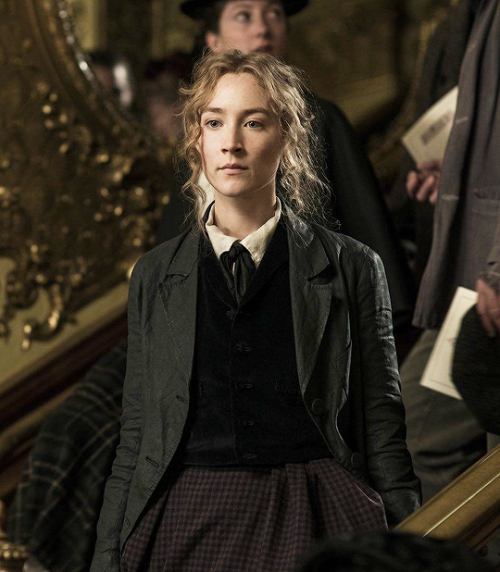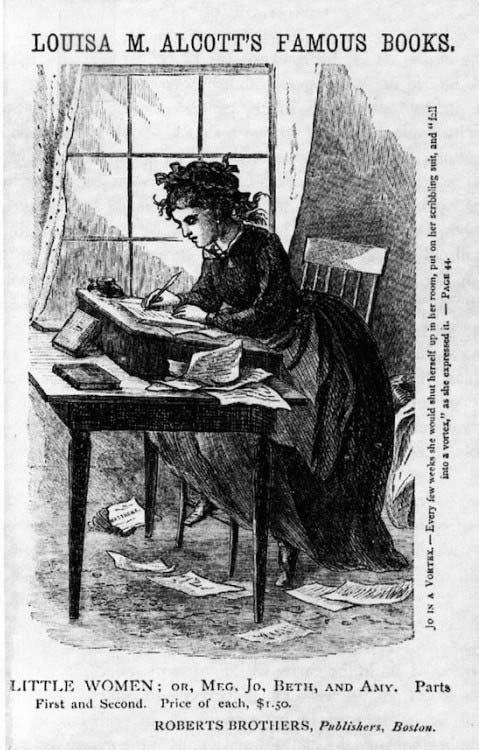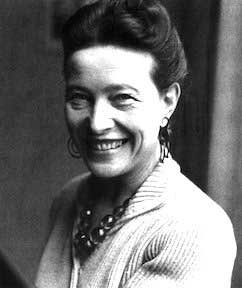10 Writers Who Were Inspired by Jo March of Little Women
By Nava Atlas | On September 2, 2017 | Updated August 2, 2024 | Comments (4)

Jo March, the standout sister among the quartet in Little Women, is one of the most iconic and influential female characters in literature. Here we’ll take a look at ten women writers who were inspired by Jo March. Certainly, there are countless others — maybe even you!
What’s unique and wondrous is that the fictional character of Jo March influenced generations of women writers, more so even than the real-life author who wrote her into existence.
Tomboyish and ambitious, with a bit of a temper, Jo was an idealized alter ego of her creator, Louisa May Alcott.
Jo longed to be a writer more than anything, and to find that happy medium between achieving independence and finding love, something that was expected of women of her time. This was something that Louisa didn’t achieve in her own life, quite possibly, by choice.
Harriet Reisen, an Alcott biographer, encapsulated that certain quality that made Jo such a role model to legions of would-be writers:
“Like millions of girls, I saw myself as Jo March, Louisa Alcott’s literary alter ego … Jo was passionate and brave, and like me had a tendency to get lost in thought. My mother had presented me with Little Women, ceremoniously, as if bestowing the key to a magic kingdom.
The wise and funny authorial voice of Louisa May Alcott spoke like another mother to me, giving permission to be flawed, license to dream, and encouragement to do good.”
In an homage to Little Women on the occasion of its 150th anniversary (2018), Sarah Lyall wrote in the New York Times:
“The book, especially in its creation of Jo — independent, unconventional, irreverent, impatient, devoted to her writing and proud of her ability to earn money at it — has been an inspiration and a model. Jo has always appealed to tomboys, rebels, and freethinkers, her passion for creativity providing aspiring writers with a glimpse of how to operate in the world.”
Jo March as depicted in film numerous times over the decades has helped cement her iconic status. Makes sure to scroll to the very end for a list of other authors who have written or spoken about the influence of Little Woman and its most iconic character on their lives and work.
. . . . . . . . . . .
Winona Ryder portraying Jo March in the 1994 movie version of Little Women
. . . . . . . . . . .

Saoirse Ronan as Jo March in Little Women (2019)
Which of these two most recent film adaptations of Little Women do you prefer? I’m squarely on team 1994!
. . . . . . . . . . .
Simone de Beauvoir
Photo: Wikimedia Commons
The French feminist, novelist, and philosopher Simone de Beauvoir wrote in 1958 that she saw in Jo March “a glimpse of my future self … I identified myself passionately with Jo, the intellectual. Brusque and bony, Jo clambered up into trees when she wanted to read; she was much more tomboyish and daring than I was, but I shared her horror of sewing and housekeeping and her love of books.”
And further: “Reading this novel gave me an exalted sense of myself. It helped me to identify with that young girl and to find comfort in myself when I read it. I felt such esteem for Jo that I was able to tell myself that I too was like her, and therefore it did not matter if society was cruel, because I too would be superior and find my place.”
. . . . . . . . . . .
Barbara Kingsolver

Photo by Terry Ballard, courtesy of Wikimedia Commons (2018)
Barbara Kingsolver, the acclaimed author of fiction and nonfiction, was all in on Jo, writing in 1995: “I, personally am Jo March, and if her author Louisa May Alcott had a whole new life to live for the sole pursuit of talking me out of it, she could not.”
. . . . . . . . . . .
Ursula K. Le Guin

Photo by Marian Wood Kolisch,
courtesy of Wikimedia Commons (1995)
The multi-award-winning science fiction and fantasy author Ursula K. Le Guin wrote in 1988:
“From the immediacy, the authority, with which Frank Merrill’s familiar illustrations of Little Women came to my mind as soon as I asked myself what a woman writing looks like, I know that Jo March must have had real influence upon me when I was a young scribbler.
I am sure she has influenced many girls, for she is not like most ‘real’ authors, either dead or inaccessibly famous; nor, like many artists in books, is she set apart by sensitivity or suffering or general superlativity; nor is she, like most authors in novels, male. She is close as a sister and common as grass.”
. . . . . . . . . . .
Gail Mazur

Photo: Harvard Radclyffe Institute (2008)
Poet Gail Mazur wrote: “Jo has given generations of readers like … me permission to try to become who we wished. She has helped us to recognize — and to live with, knowing we’re not alone — the conflict between the writer’s need for solitude and self-absorption and the yearning for the warmth of love.”
. . . . . . . . . . .
Cynthia Ozick

Photo: Gerard Murrell
Fiction writer and essayist Cynthia Ozick wrote in a 1982 essay on how she became a writer:
“I read Little Women a thousand times. Ten thousand. I am no longer incognito, not even myself. I am Jo in her ‘vortex’; not Jo exactly but some Jo-of-the-future. I am under an enchantment: Who I truly am must be deferred, waited for and waited for.”
. . . . . . . . . . .
Ann Petry

Photo: Carl Van Vechten
The Street by Ann Petry was the first novel by an African American author to sell more than a million copies (eventually selling 1.5 million). She took much inspiration from Jo:
“I couldn’t stop reading because I had encountered Jo March. I felt as though I was part of Jo and she was part of me. I too, was a tomboy and a misfit and kept a secret diary … She said things like ‘I wish I was a horse, then I could run for miles in the splendid air and not lose my breath.’ I found myself wishing the same thing whenever I ran for the sheer joy of running. She was a would-be writer and so was I.”
. . . . . . . . . . .
Anna Quindlen

Photo by Bernard Gotfryd, courtesy of Wikimedia Commons
Former New York Times columnist and prolific novelist Anna Quindlen wrote in 1994, “Little Women changed my life.” And when asked about who her childhood idol was, she responded:
“Jo March … she wanted to be a writer, she became a writer. She stopped caring that she wasn’t pretty. She sold her hair to send her mother to visit their father during the Civil War. I even forgave her for not marrying Laurie.”
. . . . . . . . . . .
Anne Lamott

Photo: Wikimedia Commons (2013)
Anne Lamott, author or fiction, memoir, and the classic book on writing for writers at all levels, referenced Jo in a piece on some favorite books in her library:
“[Little Women] was one of the first real chapter books I read, and I got lost in this story of a strong, compassionate mother trying to raise four distinctly different daughters while their father was away ministering to soldiers in the Civil War. I was a tomboy, and here was feisty Jo March — a free spirit and very protective of her young sisters.”
. . . . . . . . . . .
Sonia Sanchez

Photo: Wikimedia Commons
Prolific poet and activist Sonia Sanchez, who has in turn been a major inspiration to countless female poets of color, felt a kinship with Jo:
“I understood what it was like being an outsider … I didn’t identify with Beth and all the others … They were too formal, and they were women you expected them to be, but Jo broke the mold.”
. . . . . . . . . . .
Patti Smith

Photo: Wikimedia Commons, (1978)
When asked what book first inspired her to become a writer, poet, memoirist, and punk goddess Patti Smith responds with some variation of this passage from Just Kids (2010):
“I drew comfort from my books. Oddly enough, it was Louisa May Alcott who provided me with a positive view of my female destiny. Jo, the tomboy of the four March sisters in Little Women, writes to help support her family, struggling to make ends meet during the Civil War.
She fills page after page with her rebellious scrawl, later published in the literary pages of her local newspaper. She gave me the courage of a new goal, and soon I was crafting little stories and spinning long yarns for my brother and sister. From that time on, I cherished the idea that one day I would write a book.”
. . . . . . . . . . .
Here are more women authors who have spoken or written about the influence of Jo March on their lives and work. I’m sure there are many more, because, per the title of a Born of Wonder podcast episode, “We All Want to Be Jo March.”
Amy Bloom
Susan Cheever
Delia Ephron
Nora Ephron
Erica Jong
Carson McCullers
Stephanie Meyers
Joyce Carol Oates
Sara Paretsky
Susan Sontag
. . . . . . . . . . .

Did Little Women’s Jo March Become a Writer?
. . . . . . . . . . .
This passage from Little Women describes how Jo got into the zone, so to speak, when she was in a frenzy of writing. Undoubtedly, it reflects Louisa’s real-life process. What writer wouldn’t love to fall into this kind of vortex at will?
Every few weeks she would shut herself up in her room, put on her scribbling suit, and “fall into a vortex,” as she expressed it, writing away at her novel with all her heart and soul, for till that was finished she could find no peace …
She did not think herself a genius by any means; but when the writing fit came on, she gave herself up to it with entire abandon, and led a blissful life, unconscious of want, care, or bad weather, while she sat safe and happy in an imaginary world, full of friends almost as real and dear to her as any in the flesh.
Sleep forsook her eyes, meals stood untasted, day and night were all too short to enjoy the happiness which blessed her only at such times, and made these hours worth living, even if they bore no other fruit. The divine afflatus usually lasted a week or two, and then she emerged from her “vortex” hungry, sleepy, cross, or despondent.


What a wonderful piece and what an incredibly diverse–in terms of subject matter, writing style, and so many other qualities–set of writers. I wonder if Alcott had any inkling of the power of her creation?
Hi Lynne — probably not at first, since Louisa didn’t even want to write this book … but I think when she began to receive so many warm letters from readers, she may have gotten an inkling of Jo’s appeal. She probably couldn’t begin to imagine how inspiring her idealized alter ego would be for generations of writers!
Louisa is nearly an alter ego. I professionally portray her in “Louisa May Alcott: Beyond Little Women” for chautauquas, schools, libraries, for 25 years now. Descendants of Anna have enjoyed my work and that is a great honor and joy.
That’s amazing, Marianne — what a great career. Thanks for the comment!